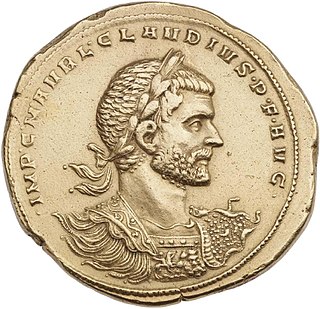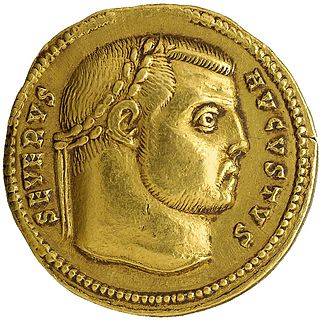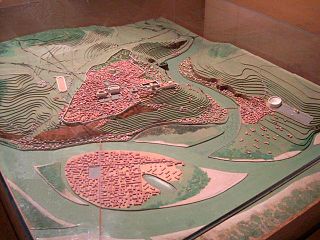Related Research Articles

Roman Britain refers to the period in classical antiquity when large parts of the island of Great Britain were under occupation by the Roman Empire. The occupation lasted from AD 43 to AD 410. During that time, the territory conquered was raised to the status of a Roman province.

Vespasian was a Roman emperor who reigned from AD 69 to 79. The fourth and last emperor who reigned in the Year of the Four Emperors, he founded the Flavian dynasty that ruled the Empire for 27 years. His fiscal reforms and consolidation of the empire generated political stability and a vast Roman building program.
The 40s decade ran from January 1, AD 40, to December 31, AD 49.
The 90s ran from 90 AD to 99 AD.

Marcus Aurelius Claudius "Gothicus", also known as Claudius II, was Roman emperor from 268 to 270. During his reign he fought successfully against the Alemanni and decisively defeated the Goths at the Battle of Naissus. He died after succumbing to a "pestilence", possibly the Plague of Cyprian that had ravaged the provinces of the Empire.

Decimius Magnus Ausonius was a Roman poet and teacher of rhetoric from Burdigala in Aquitaine, modern Bordeaux, France. For a time he was tutor to the future emperor Gratian, who afterwards bestowed the consulship on him. His best-known poems are Mosella, a description of the river Moselle, and Ephemeris, an account of a typical day in his life. His many other verses show his concern for his family, friends, teachers, and circle of well-to-do acquaintances and his delight in the technical handling of meter.

Arrian of Nicomedia was a Greek historian, public servant, military commander and philosopher of the Roman period.

Constantius III was Roman emperor of the West in 421, from 8 February until his death on 2 September. He earned his position as Emperor due to his capability as a general under Honorius, achieving the rank of magister militum by 411. That same year, he suppressed the revolt of Constantine III, a Roman general who had declared himself emperor. Constantius then went on to lead campaigns against various barbarian groups in Hispania and Gaul, recovering much of both for the Western Roman Empire. Constantius married Honorius's sister Galla Placidia in 417, a sign of his ascendant status, and was proclaimed co-emperor by Honorius on 8 February 421. He reigned for seven months before dying on 2 September 421.

The Gallic Empire or the Gallic Roman Empire are names used in modern historiography for a breakaway part of the Roman Empire that functioned de facto as a separate state from 260 to 274. It originated during the Crisis of the Third Century, when a series of Roman military leaders and aristocrats declared themselves emperors and took control of Gaul and adjacent provinces without attempting to conquer Italy or otherwise seize the central Roman administrative apparatus.

Flavius Valerius Severus, also called Severus II, was a Roman emperor from 306 to 307. After failing to besiege Rome, he fled to Ravenna. It is thought that he was killed there or executed near Rome.

The Western Roman Empire comprises the western provinces of the Roman Empire at any time during which they were administered by a separate independent Imperial court; in particular, this term is used in historiography to describe the period from 286 to 476, where there were separate coequal courts dividing the governance of the empire in the Western and the Eastern provinces, with a distinct imperial succession in the separate courts. The terms Western Roman Empire and Eastern Roman Empire were coined in modern times to describe political entities that were de facto independent; contemporary Romans did not consider the Empire to have been split into two empires but viewed it as a single polity governed by two imperial courts as an administrative expediency. The Western Roman Empire collapsed in 476, and the Western imperial court in Ravenna was formally dissolved by Justinian in 554. The Eastern imperial court survived until 1453.

Gaius Pius Esuvius Tetricus was the emperor of the Gallic Empire from 271 to 274 AD. He was originally the praeses (governor) of Gallia Aquitania and became emperor after the murder of Emperor Victorinus in 271, with the support of Victorinus's mother, Victoria. During his reign, he faced external pressure from Germanic raiders, who pillaged the eastern and northern parts of his empire, and the Roman Empire, from which the Gallic Empire had seceded. He also faced increasing internal pressure, which led him to declare his son, Tetricus II, caesar in 273 and possibly co-emperor in 274, although this is debated. The Roman emperor Aurelian invaded in 273 or 274, leading to the Battle of Châlons, at which Tetricus surrendered. Whether this capitulation was the result of a secret agreement between Tetricus and Aurelian or necessary after his defeat is debated. Aurelian spared Tetricus, and even made him a senator and corrector (governor) of Lucania et Bruttium. Tetricus died of natural causes a few years after 274.

Colonia Copia Claudia Augusta Lugdunum was an important Roman city in Gaul, established on the current site of Lyon. The Roman city was founded in 43 BC by Lucius Munatius Plancus, but continued an existing Gallic settlement with a likely population of several thousands. It served as the capital of the Roman province of Gallia Lugdunensis and was an important city in the western half of the Roman Empire for centuries. Two emperors, Claudius and Caracalla, were born in Lugdunum. In the period AD 69–192 the city's population may have numbered 50,000 to 100,000, and possibly up to 200,000 inhabitants.

The gens Flavia was a plebeian family at ancient Rome. Its members are first mentioned during the last three centuries of the Republic. The first of the Flavii to achieve prominence was Marcus Flavius, tribune of the plebs in 327 and 323 BC; however, no Flavius attained the consulship until Gaius Flavius Fimbria in 104 BC. The gens became illustrious during the first century AD, when the family of the Flavii Sabini claimed the imperial dignity.

Roman Gaul refers to Gaul under provincial rule in the Roman Empire from the 1st century BC to the 5th century AD.
Afranius Syagrius was a Roman politician and administrator.
Siburius, for whom only the single name survives, was a high-ranking official of the Roman Empire. He was one of several Gauls who rose to political prominence in the late 4th century as a result of the emperor Gratian's appointment of his Bordelaise tutor Ausonius to high office.
Claudius Antonius was a Roman politician under the reigns of Valentinian I, Gratian and Theodosius I. He was appointed consul in AD 382 alongside Afranius Syagrius.
References
- ↑ Wright, Thomas (1854). Wanderings of an Antiquary: Chiefly Upon the Traces of the Romans in Britain. J. B. Nichols and Sons. p. 98 . Retrieved September 8, 2015.
Flavius Sanctus governor.
- ↑ Jones, Michael E. (1998). The End of Roman Britain. Cornell University Press. pp. 153–154. ISBN 0801485304 . Retrieved September 8, 2015.
- ↑ Salway, Peter (2001). A History of Roman Britain. Oxford University Press. p. 254. ISBN 0192801384 . Retrieved September 8, 2015.
- ↑ Mattingly, David (2008). AN Imperial Possession: Britain in the Roman Empire, 54 BC - AD 409. Penguin Group. ISBN 978-1101160404 . Retrieved September 8, 2015.
- ↑ Smith, Charles Roach (1850). The Antiquities of Richborough, Reculver, and Lymne, in Kent. John Russell Smith Press. p. 11 . Retrieved September 8, 2015.
Flavius Sanctus governor.
- ↑ Sivan, Hagith (2003). Ausonius of Bordeaux: Genesis of a Gallic Aristocracy. Routledge. p. 59. ISBN 1134884494 . Retrieved September 8, 2015.
- ↑ Ashley, Michael (2002). A Brief History of British Kings & Queens. p. 421. ISBN 0786711043.
- ↑ Petts, David (2003). Christianity in Roman Britain. Tempus Books. p. 43. ISBN 0752425404 . Retrieved September 8, 2015.